Teaching Strategies for Gifted Students
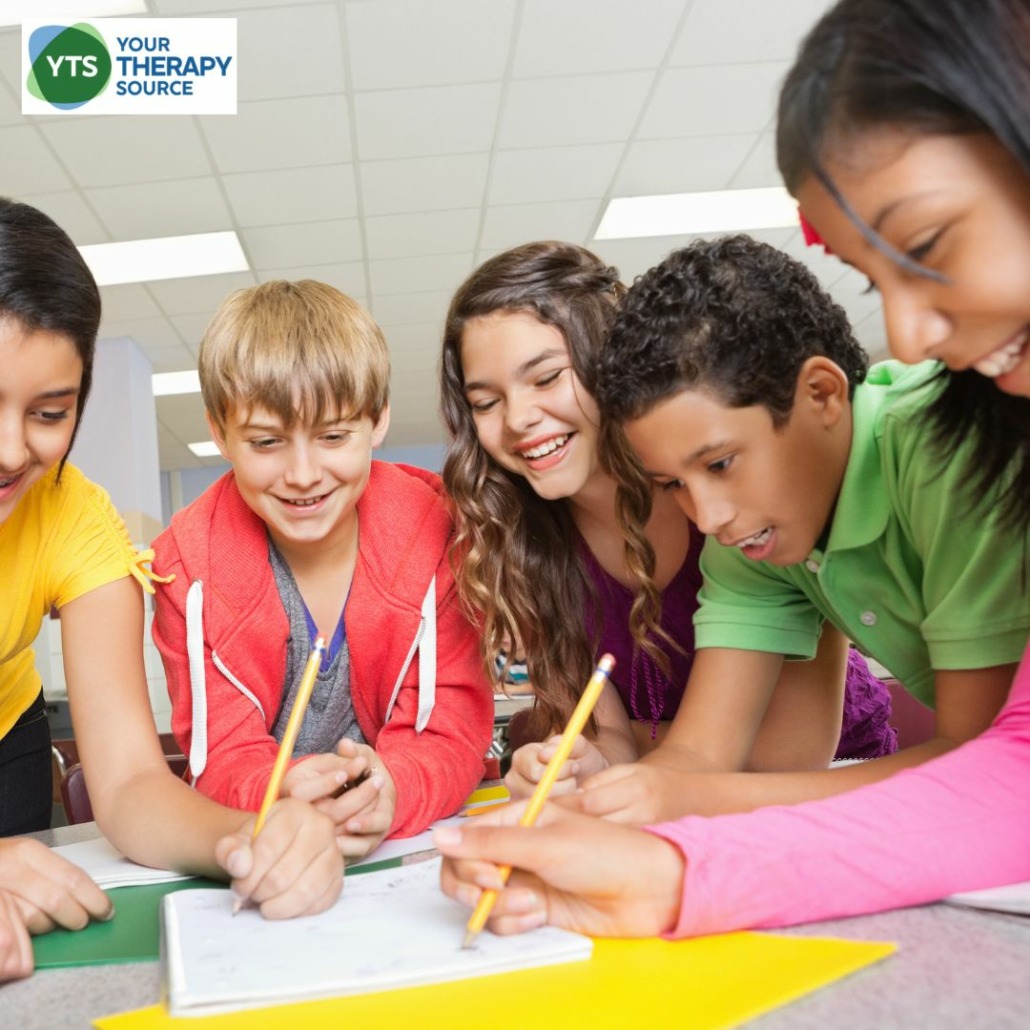
Educating gifted students requires understanding their unique needs and employing specialized strategies to foster their growth. For classroom teachers, counselors, speech therapists, and parents, knowing how to adapt and elevate the learning experiences for these talented children is very important. Learn more about various teaching strategies for gifted students and how you can implement them.
The Importance of Specific Teaching Strategies for Teaching Gifted Students
Gifted students, often characterized by their heightened abilities in one or multiple domains, bring a unique set of qualities to the educational environment. They’re often intellectually curious, display an intense passion for specific topics, think critically, and make connections that others might not readily see. However, these strengths can also present challenges if not properly nurtured. Here’s why it’s imperative to have specific teaching strategies tailored to gifted learners:
- Meeting Diverse Needs: Just as special education students require individualized plans to cater to their unique needs, gifted students also benefit from differentiation. Giftedness isn’t one-size-fits-all; it’s a spectrum with varied domains and intensities. Tailored strategies recognize and cater to these differences, ensuring that each student’s potential is maximized.
- Preventing Underachievement: Without appropriate challenges, gifted students may become disengaged, leading to underachievement. Specific strategies provide the rigor and depth these students crave, ensuring they remain motivated and invested in their education.
- Addressing Emotional and Social Needs: Many gifted students experience asynchronous development—meaning their intellectual abilities might not align with their emotional or social maturity. Specialized strategies can help address the unique social and emotional challenges they face, such as perfectionism, heightened sensitivity, or feelings of isolation.
- Promoting Lifelong Learning: Gifted children are often intrinsically motivated to learn. By implementing strategies that cater to their needs, educators can foster a love for learning, encouraging these students to become lifelong learners who continually seek to expand their knowledge and skills.
- Utilizing Their Potential for Broader Impact: When equipped with the right tools and guidance, gifted students can make significant contributions to society. By nurturing their talents early on, educators pave the way for innovations, solutions, and advancements in various fields in the future.
- Preventing Boredom and Behavior Issues: A lack of challenge can lead to boredom for gifted students. When not intellectually stimulated, these students might exhibit disruptive behaviors or even face mental health issues. Targeted strategies ensure they remain engaged, reducing the likelihood of such challenges.
- Enhancing Peer Interactions: Gifted children sometimes struggle with peer interactions due to differences in interests, maturity, or communication styles. By implementing specific group work or discussion strategies, educators can foster better understanding and collaboration among diverse student groups.
- Building Resilience and Coping Skills: Without experiencing challenges, gifted students might not develop resilience or learn how to cope with failure. Tailored strategies can introduce appropriate challenges, teaching them that setbacks are a natural part of the learning process.
- Validating Their Experiences: Recognizing the need for specific strategies for gifted students sends a clear message: their experiences, challenges, and needs are valid. This acknowledgment can boost their self-esteem and sense of belonging in the educational environment.
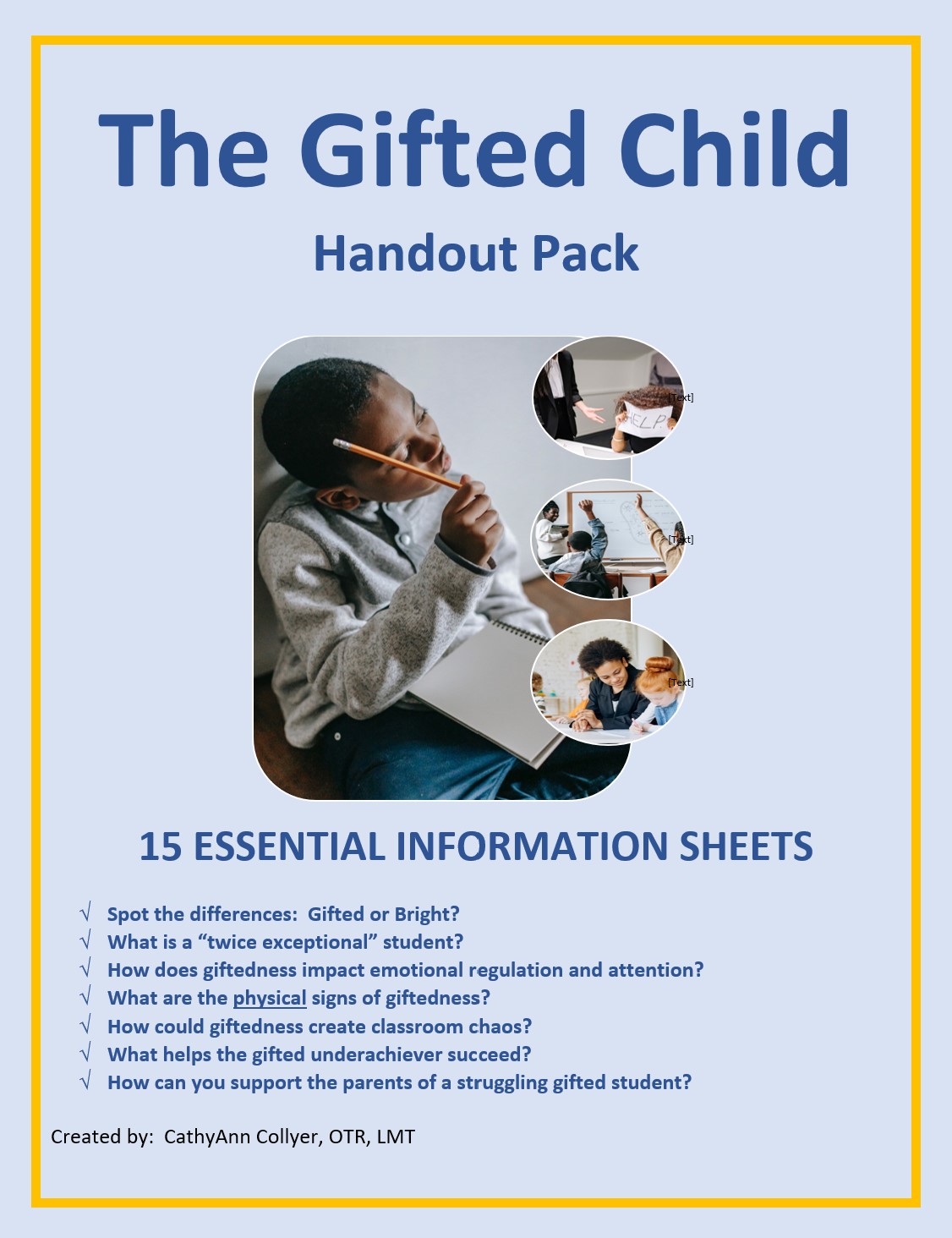
The Gifted Child Handout Packet
Ideas and Suggestions for Teaching Strategies for Gifted Students
While all students deserve a tailored educational experience, gifted students present unique challenges and opportunities that warrant specialized attention. The right strategies can unlock their immense potential, benefiting not only the students themselves but also their communities and society at large. By investing in tailored approaches for gifted education, educators and school districts affirm the value of diversity in learning and the importance of nurturing every student’s individual gifts. Here are some ideas with miscellaneous examples of how the teaching strategies for gifted students could be implemented.
Differentiation
Definition: Tailoring educational experiences based on each student’s readiness level, interest, or learning profile.
Implementation: Modify lesson plans to cater to each student’s needs. For instance, during a social studies unit, while some students work on a structured assignment, gifted learners could be tasked with an independent project where they explore current events and their implications at a deeper level.
Acceleration
Definition: Allowing students to progress through the curriculum at a faster pace commensurate with their abilities.
Implementation: School districts can pre-test students at the beginning of the academic year to determine their existing knowledge. Based on the results, students can be given the opportunity to skip content they’ve mastered or even move to a higher grade level for specific subjects.
Enrichment
Definition: Providing additional materials and activities that deepen students’ understanding of a topic.
Implementation: In a science class, after teaching the foundational concepts, offer advanced students additional resources such as online courses, TED talks, or books that delve deeper into the subject matter.
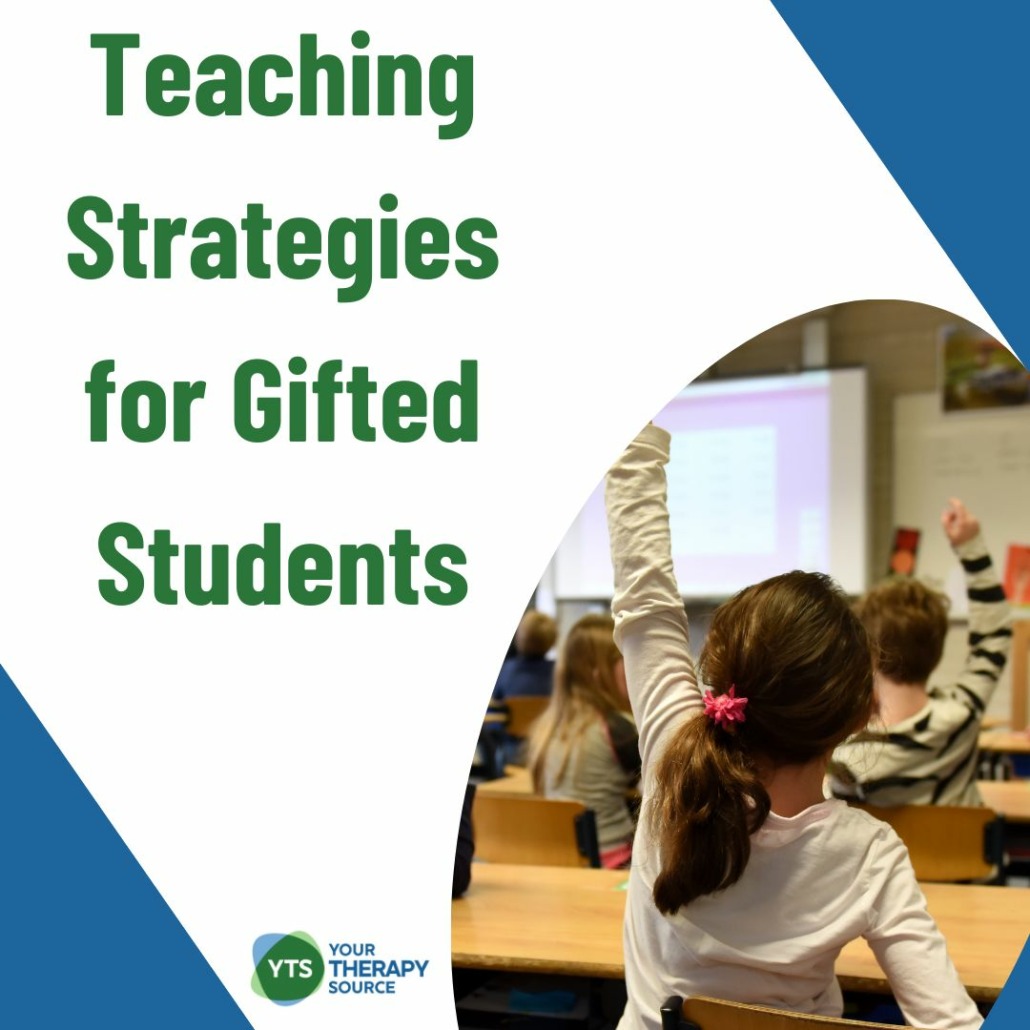
Teaching Strategies for Gifted Students – Try Independent Study
Definition: Allowing students to explore topics of their own interest with minimal guidance.
Implementation: Teachers can designate a portion of the week as “independent study time.” During this period, gifted students choose a topic, set learning objectives, and pursue research, later presenting their findings. Try independent research projects too!
Mentorship
Definition: Pairing gifted students with mentors who can guide them in their area of interest.
Implementation: Local organizations or even high school and college students can collaborate with school districts to offer mentorship programs. A budding middle-school writer, for instance, might work with a local author or journalist.
Cluster Grouping
Definition: Grouping gifted students together for specific subjects or projects.
Implementation: During group work, teachers can intentionally form small groups of gifted learners to tackle more complex tasks or facilitate more in-depth discussions.
Project-Based Learning
Definition: Presenting students with real world problems to solve using their research and critical thinking skills.
Implementation: Instead of traditional lessons, present students with real-world issues—like environmental challenges—and guide them to do independent projects researching solutions and proposing action plans.
Socratic Seminars
Definition: Facilitating deep discussions where students can question, reason, and critically analyze topics.
Implementation: Designate a day for a Socratic seminar where students discuss a contentious issue, encouraging them to voice differing opinions and provide supporting evidence.
Tiered Assignments
Definition: Creating tasks of varying complexity within a single assignment or activity.
Implementation: In a math class, offer three levels of problems: foundational, intermediate, and advanced. Allow students to select the level they’re comfortable with, encouraging advanced learners to tackle more complex challenges.
Compacting
Definition: Eliminating redundant work for students after pre-assessing their knowledge and skills.
Implementation: After a pre-assessment, provide gifted students with compacted instructional strategies, enabling them to fast-track through known material and delve into more advanced content.
Teaching Strategies for Gifted Students – Use Technology
Definition: Leveraging digital tools, applications, and platforms tailored to cater to the unique needs and interests of the students.
Implementation: Integrate platforms like Khan Academy or Coursera, allowing gifted students to explore topics beyond the standard curriculum at their own pace.
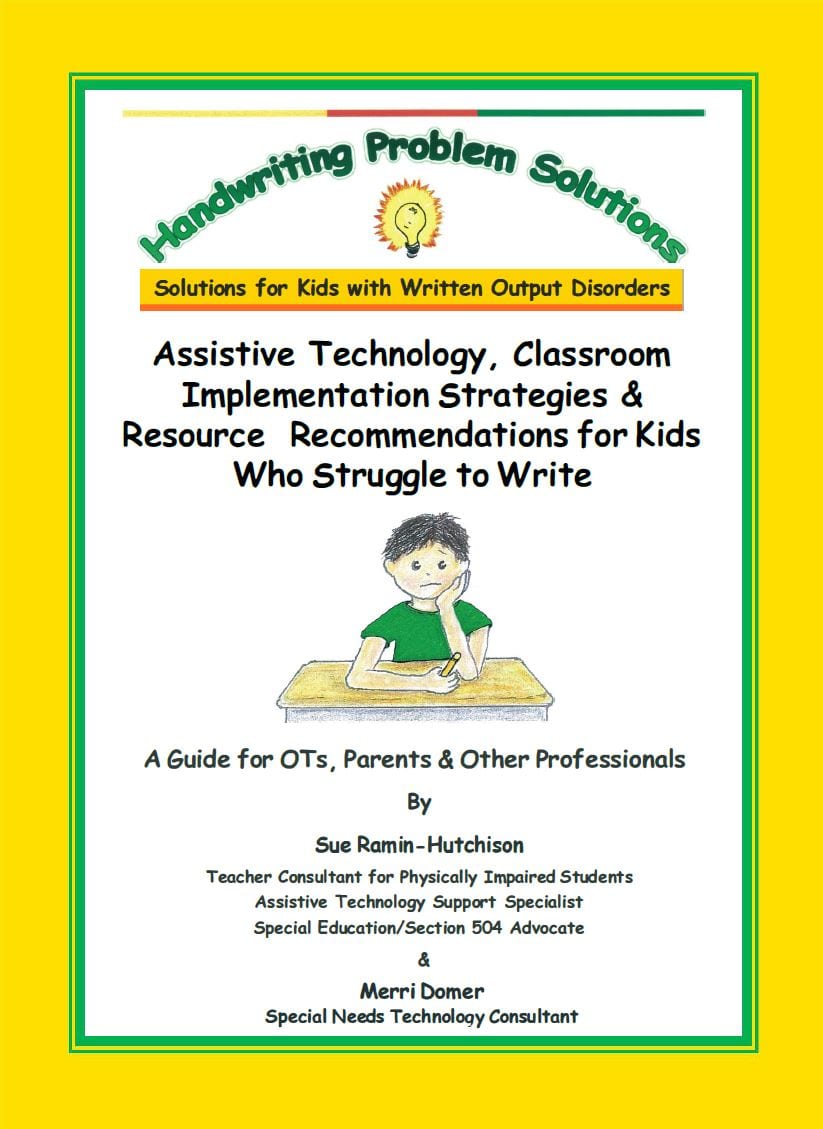
Assistive Technology, Classroom Implementation Strategies & Resource Recommendations for Kids Who Struggle to Write
Flexible Grouping
Definition: A strategy where students are placed in different groups depending on the activity or subject, ensuring varied interactions.
Implementation: In a math class, group gifted students together for advanced problem-solving, and in a literature class, mix them with peers of varied abilities for diverse perspectives in discussions.
Think Tanks
Definition: Group discussions where students collaboratively address complex questions or issues.
Implementation: Facilitate monthly “Think Tank” sessions where students dissect current events or ethical dilemmas, encouraging in-depth exploration.
Learning Contracts
Definition: Agreements that outline specific learning objectives, methods, and timelines tailored to the student’s needs.
Implementation: For a gifted student eager to study quantum physics, draft a contract detailing resources, study timeline, and evaluation methods.
Analogies and Metaphors
Definition: Utilizing comparative methods to link unfamiliar concepts to known entities, enhancing understanding.
Implementation: When teaching cellular biology, compare the cell to a city, where organelles are likened to city infrastructure, fostering relatable understanding.
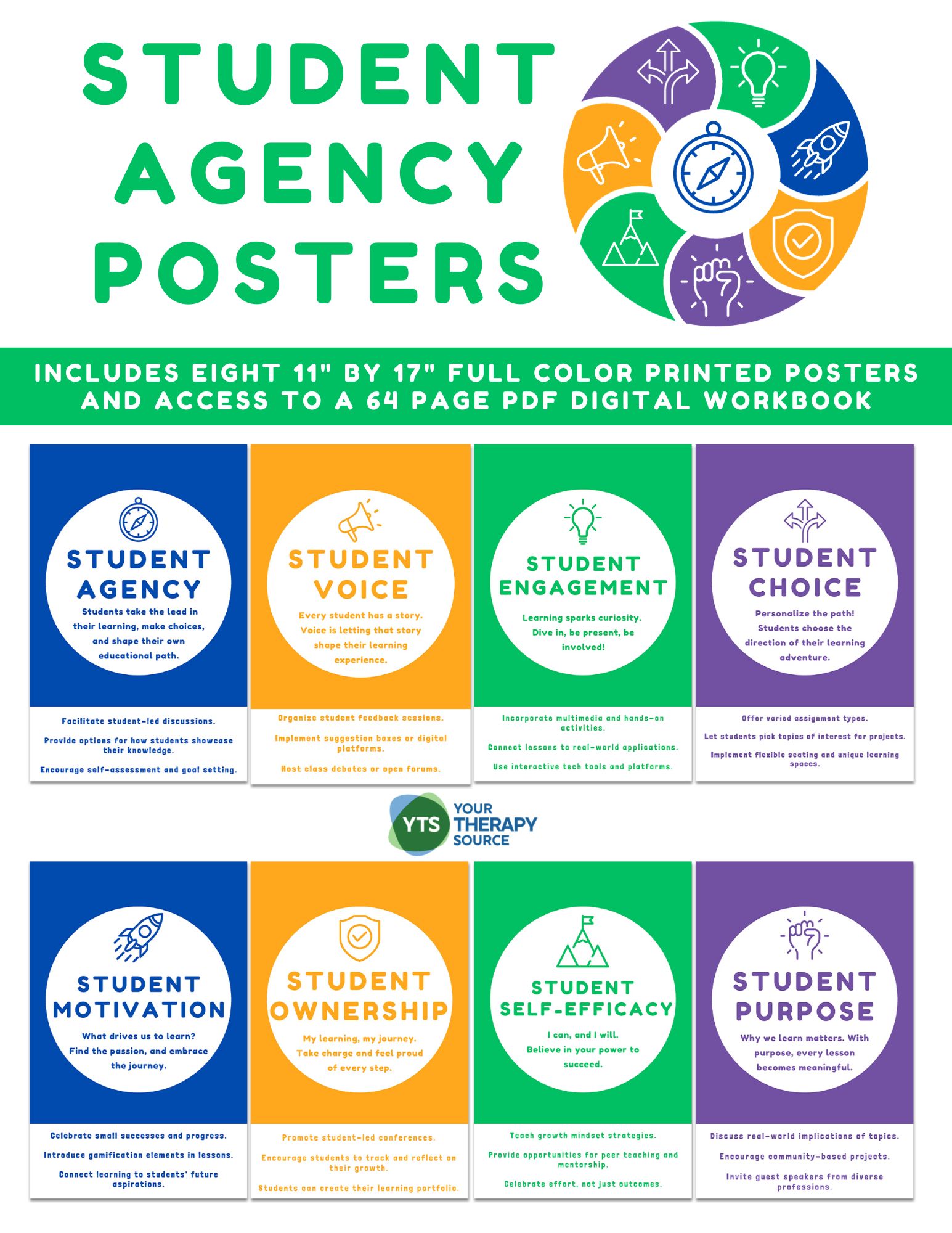
Student Agency Poster Packet + BONUS Digital PDF Workbook
Depth and Complexity Icons
Definition: Symbols used to signify different layers of content understanding, from patterns to ethical considerations. Used for advanced skills and older students.
Implementation: Incorporate icons in assignments. For instance, use a specific icon when asking students to approach a topic from multiple perspectives.
Advanced Texts
Definition: Reading materials that offer deeper or more intricate content than standard grade-level texts.
Implementation: A simple way is to offer gifted students novels with complex themes or scientific journals that delve deeper into topics discussed in class.
Field Trips
Definition: Organized excursions outside the classroom to enrich learning experiences.
Implementation: Visit a local research lab or museum to provide firsthand insights.
Guest Speakers
Definition: Inviting subject-matter experts to share their knowledge and experiences with students.
Implementation: One effective way is to explore your staff at the school. Many times you may have staff on hand who are very knowledgeable in a specific area. If not, explore your local area or urban areas to invite guest speakers.
Academic Competitions
Definition: Platforms where students can showcase their knowledge and skills, often against their peers.
Implementation: Encourage participation in events like the Math Olympiad or National Science Bowl to challenge and stimulate gifted learners.
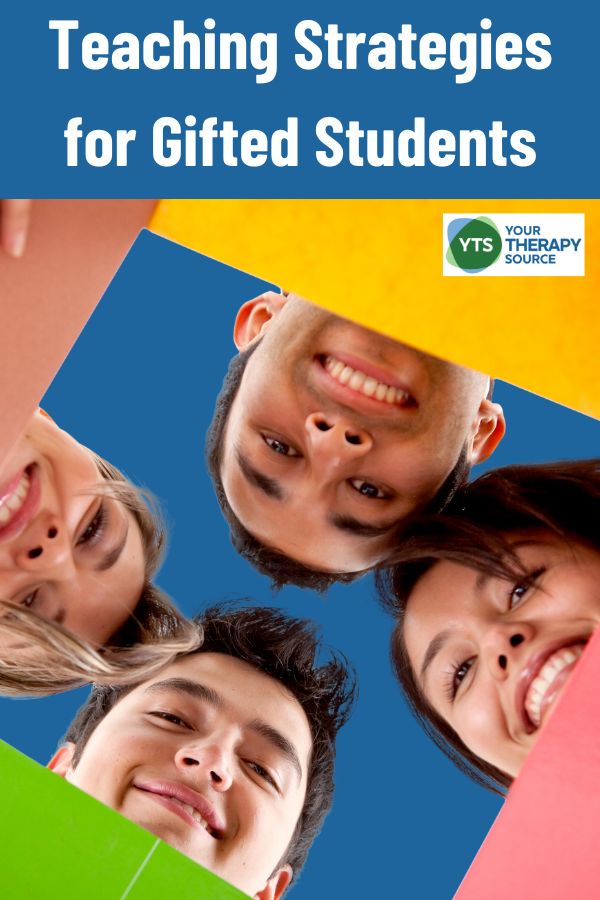
Portfolios
Definition: Collections of student work that display their progress, skills, and achievements over time.
Implementation: Introduce e-portfolios, allowing students to upload projects, essays, and other works, facilitating reflection and self-assessment.
Cross-Curricular Integration
Definition: Merging concepts from different subjects to offer a comprehensive understanding of a topic.
Implementation: During a lesson, combine information from science, art, math, history, and literature to give a panoramic view of the topic.
Simulation and Role Play
Definition: Activities where students emulate real-world problems, scenarios or personas to deepen their grasp on a topic.
Implementation: For example, let students enact the roles of world leaders during pivotal moments in history, allowing them to “experience” the decision-making process. Try different Nobel prize winners or famous scientists too!
Peer Teaching
Definition: A method where students teach or tutor their peers, reinforcing their own understanding in the process.
Implementation: Pair advanced students with classmates for sessions where they explain challenging concepts, benefitting both parties.
Journals
Definition: Personal writing spaces where students can reflect, explore ideas, and express their thoughts.
Implementation: Initiate weekly journaling sessions, encouraging gifted students to pen down their thoughts on varied topics or personal experiences.
Extension Activities
Definition: Supplementary tasks that go beyond the standard curriculum, catering to the advanced needs of gifted students.
Implementation: After teaching a unit, offer an extension activity where students can explore higher levels of the topic such as ethics.
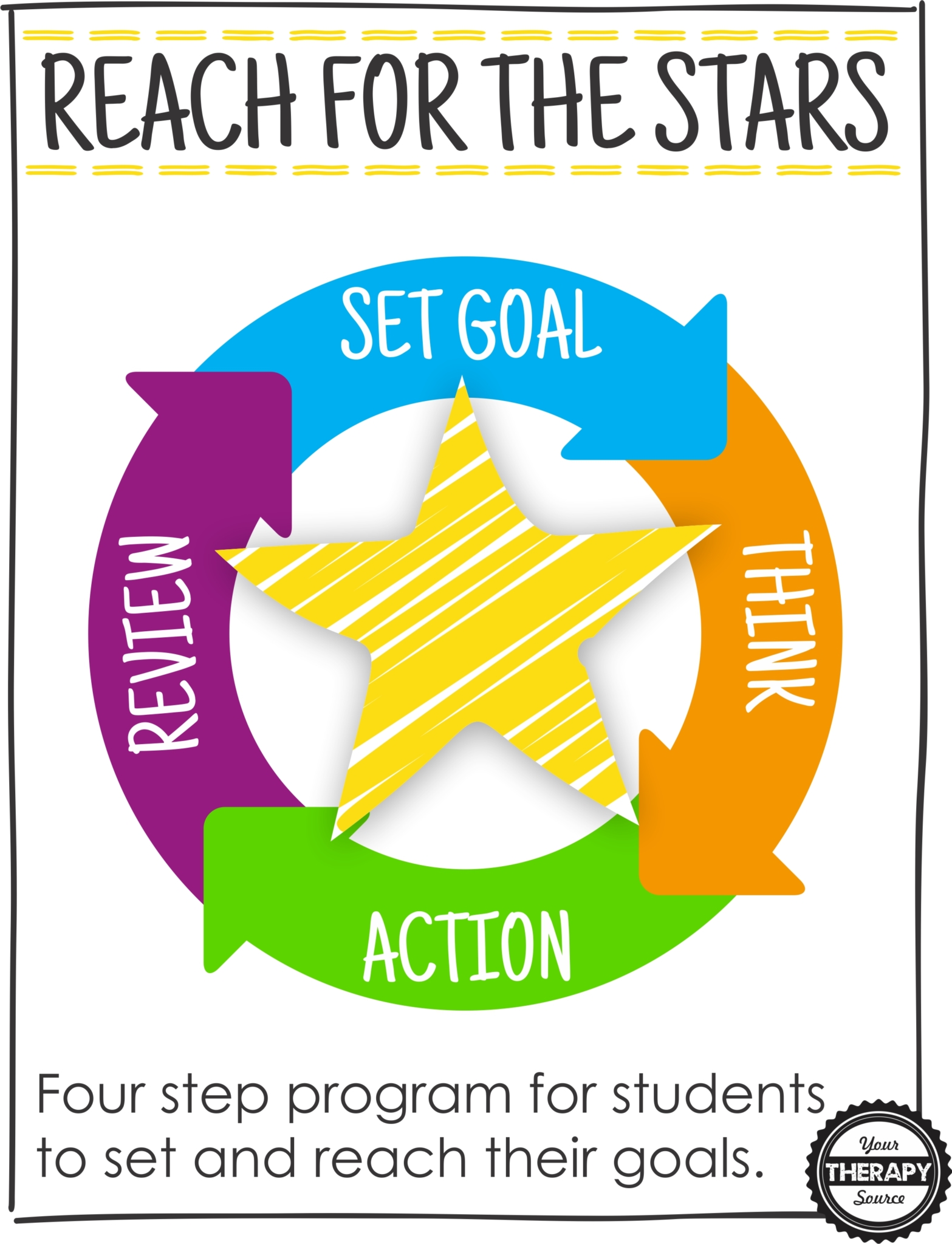
Goal Setting for Students PDF – Reach for the Stars
Teaching Suggestions for Gifted Students for Other Professionals
There are many other providers that help gift students beyond teachers. Here are some examples:
Counseling for Gifted Students
- Social Skills Training:
Example: A counselor can run group sessions for gifted students who often feel out of place with their peers due to asynchronous development, focusing on social skill-building activities tailored to their needs. - Emotional Regulation:
Example: Utilizing journaling or art, a counselor helps a gifted student express their feelings of frustration stemming from being accelerated a grade and feeling out of place among older students. - Career Counseling:
Example: Recognizing a gifted high school student’s multiple potential career paths, a counselor might use specialized tools and discussions to help them navigate their choices and passions.
Occupational Therapy (OT) for Gifted Students
- Sensory Integration:
Example: An OT observes that a gifted child is highly sensitive to classroom noises, impacting their concentration. They might introduce noise-canceling headphones or sensory breaks to help the student cope. - Fine Motor Skill Development:
Example: For gifted children who excel academically but struggle with tasks like handwriting, an OT can provide targeted exercises to improve their grip and coordination. - Executive Functioning Support:
Example: Recognizing that a gifted student can think of multiple solutions but struggles to organize their thoughts, an OT might introduce strategies or tools, like graphic organizers, to aid in planning and sequencing.
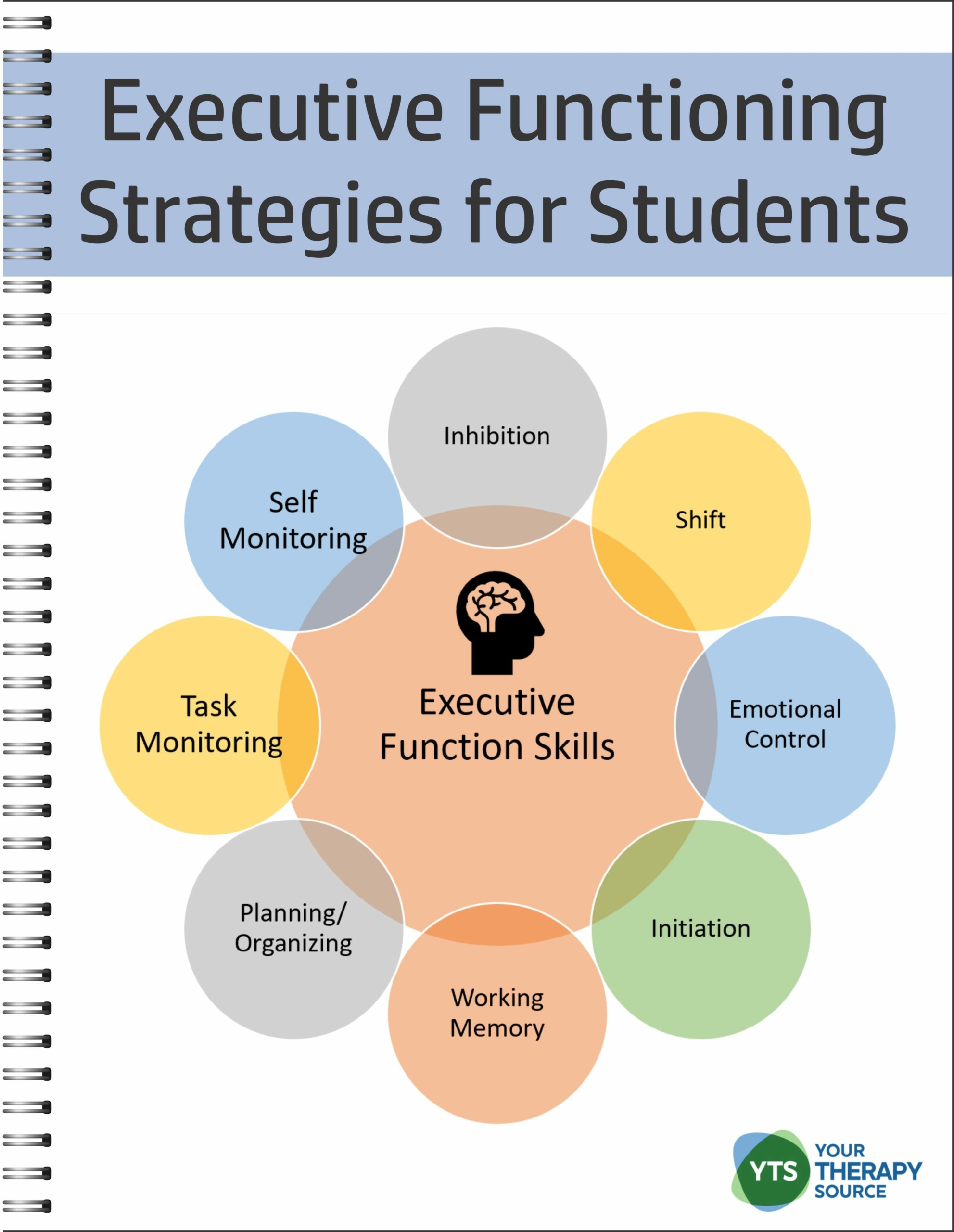
Executive Functioning Strategies for Students
Physical Therapy (PT) for Gifted Students
- Gross Motor Skills:
Example: A gifted student who spends much of their free time reading or engaging in intellectual pursuits might lag in physical activities. A PT can introduce exercises and games that promote balance, coordination, and muscle strength. - Postural Education:
Example: Recognizing that a student spends extended hours on the computer for advanced projects, a PT might teach exercises and stretches to counteract potential postural issues.
Speech Therapy for Gifted Students
- Advanced Language Development:
Example: A speech therapist might introduce advanced vocabulary and complex sentence structures to a gifted child, offering them opportunities to articulate their complex thoughts more effectively. - Social Communication Skills:
Example: Recognizing that a gifted student often dominates group discussions, a speech therapist might work on turn-taking, active listening, and other conversational skills. - Voice and Fluency:
Example: A gifted student passionate about debate might be coached by a speech therapist to modulate their voice for different contexts and ensure fluency in delivery.
Gifted children, while often excelling in specific areas, might face challenges in others. By tailoring strategies in counseling, OT, PT, and speech therapy to their unique needs, professionals can ensure holistic development for these students.
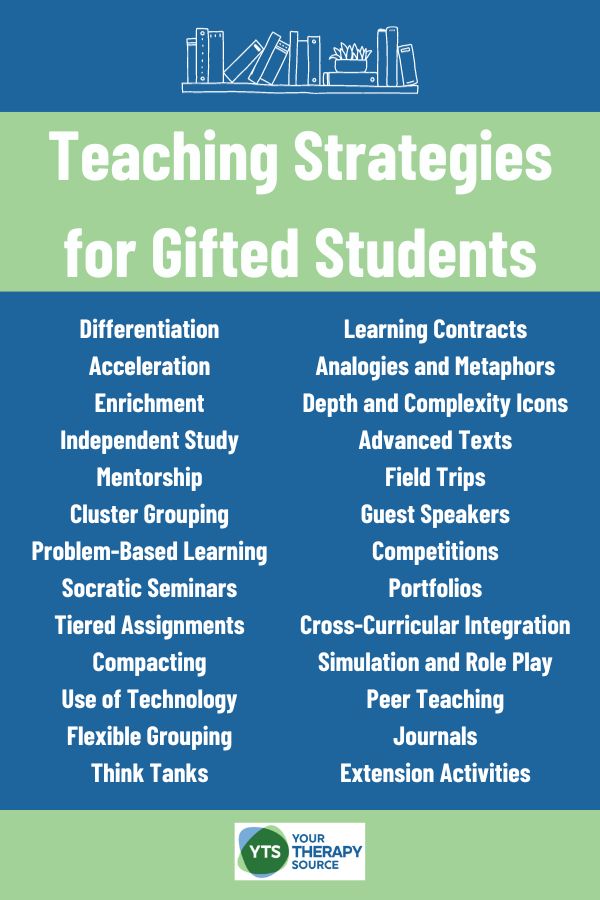
Empowering Gifted Students: A Guide for Parents
Raising a gifted child can be both a joy and a challenge. These bright students can amaze with their intellectual pursuits, but they also have unique emotional and educational needs. Fortunately, parents play a pivotal role in nurturing their gifted child’s abilities and ensuring they have a well-rounded experience. Here are some ways parents can support and guide their gifted children:
- Open Communication: Initiate regular conversations with your child about their feelings, experiences, and challenges. This can provide insights into their needs and help them feel understood and supported.
- Educational Advocacy: Partner with teachers and school officials to ensure your child’s academic needs are met. This may involve requesting differentiated instruction, considering grade acceleration, or enrolling them in gifted education programs.
- Provide Enrichment Opportunities: Beyond school, expose your child to various experiences. Museums, science centers, workshops, book clubs, and local organizations can offer enrichment that complements classroom learning.
- Encourage Exploration: Allow your child to delve into areas of interest, whether it’s a specific subject area, hobby, or activity. This fosters intrinsic motivation and deepens their love for learning.
- Social Interactions: Encourage your child to engage in group activities or clubs where they can interact with peers sharing similar interests. This can be especially beneficial for their emotional and social development.
- Emphasize Growth Mindset: Teach your child that intelligence and talents can be developed. Emphasize the value of effort, persistence, and learning from mistakes, ensuring they don’t shy away from challenges.
- Set Boundaries: While it’s essential to support their intellectual growth, it’s equally vital to ensure they have time for play, relaxation, and just being kids.
- Seek Counseling if Necessary: Some gifted children face emotional challenges like perfectionism, anxiety, or heightened sensitivity. Professional counseling or therapy, especially from those familiar with gifted individuals, can be invaluable.
- Connect with Other Gifted Families: Joining local or online communities for families of gifted children can provide support, share resources, and offer a space for shared experiences.
- Stay Updated: The field of gifted education and psychology continually evolves. Stay informed about the latest research, strategies, and resources to best support your child.
- Celebrate Achievements, Not Just Abilities: While it’s great to acknowledge your child’s innate talents, it’s essential to celebrate their hard work, perseverance, and accomplishments. This ensures they value effort as much as the outcome.
- Teach Life Skills: Intellectual prowess doesn’t automatically equate to life skills. Ensure your child learns essential skills like time management, financial literacy, and self-care.
- Cultivate Emotional Intelligence: Encourage your child to understand and manage their emotions. Tools like journals or guided discussions can be instrumental in developing emotional awareness and empathy.
- Balance Independence and Guidance: Allow your child autonomy and agency in their learning pursuits, but be available for guidance and support. This balance fosters independence while ensuring they don’t feel isolated.
In essence, while gifted children possess remarkable abilities, they thrive best in an environment that recognizes their unique needs and provides holistic support. By actively participating in their educational journey and addressing both their intellectual and emotional needs, parents can pave the way for their gifted children to flourish and achieve their full potential.
The education of gifted and talented students requires an adaptive and flexible approach, one that rises to meet their unique needs. By implementing these teaching strategies for gifted students, educators can cultivate a learning environment where gifted learners are both challenged and inspired.
Key Points – Teaching Strategies for Gifted Students
- Personalized Learning:
- Differentiate instruction based on individual student needs.
- Provide opportunities for acceleration and enrichment.
- Open Communication:
- Regularly discuss feelings, challenges, and experiences with the student.
- Collaborate with educators, therapists, and families to address unique needs.
- Enrichment Opportunities:
- Expose students to museums, workshops, and extracurricular activities.
- Encourage exploration of personal interests.
- Emotional and Social Support:
- Recognize and address unique emotional challenges like perfectionism or sensitivity.
- Encourage group activities for peer interaction and emotional growth.
- Empowerment and Independence:
- Allow students a say in their learning, perhaps through learning contracts.
- Provide guidance but also foster autonomy.
- Growth Mindset:
- Emphasize the importance of effort, resilience, and learning from mistakes.
- Celebrate achievements stemming from hard work, not just innate abilities.
- Collaborative Advocacy:
- Parents and professionals should collaborate with schools to ensure academic needs are met.
- Stay informed about the latest in gifted education and resources.
- Holistic Development:
- Beyond academics, ensure development in life skills, emotional intelligence, and self-care.
- Balance academic challenges with play, relaxation, and age-appropriate experiences.
By emphasizing these core areas, the collective efforts of teachers, professionals, and parents can ensure that gifted students are nurtured in a way that maximizes their potential and addresses their unique needs.


